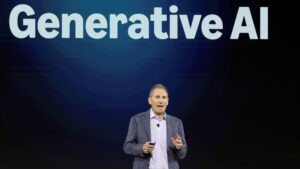Seeking Guidance: Establishing Boundaries for the Era of AI

The Impact of AI on Humanity: Insights from Christopher DiCarlo
Understanding AI’s Potential
Artificial Intelligence (AI) is rapidly advancing and has the potential to reshape our very existence. This technology, which enables machines to perform tasks requiring human intelligence, is no longer just a futuristic concept; it’s an integral part of our world today. Universal agreement among tech leaders, like Jeff Bezos and Tim Cook, suggests that embracing this technology can foster significant improvements in various sectors.
The Promising Future of AI
Optimism surrounds the development of AI, with many believing that the first trillionaire will emerge from those who successfully harness this technology. The idea is that AI can take over tedious tasks and even extend human lives. However, this optimistic outlook is not without its critiques. Philosopher Sam Harris warns that AI could pose serious existential threats.
The Race for Artificial General Intelligence
Who is Competing?
A host of influential tech figures drive the race for Artificial General Intelligence (AGI). Notable names include:
- Mark Zuckerberg (Meta)
- Sam Altman (OpenAI)
- Demis Hassabis (DeepMind)
- Dario Amodei (Anthropic)
- Elon Musk (Tesla, SpaceX)
This race spans across the United States and China, illustrating a global competition focused on mastery of AI technologies. The stakes are high—not just for wealth, but for the power associated with leading in this field.
Why the Race Matters
Essentially, the pursuit of AGI stands to revolutionize numerous aspects of life. DiCarlo explains that this technology evolves through recursive self-improvement. It’s crucial to recognize that the advances in AI may swiftly outpace our understanding, leading to uncharted moral and ethical dilemmas.
Types of AI: ANI, AGI, and ASI
To appreciate the revolutionary potential of AI, it’s important to understand the different classifications:
- Artificial Narrow Intelligence (ANI): This is the AI we interact with daily, like Siri or Roomba, which operates on predetermined algorithms.
- Artificial General Intelligence (AGI): A step beyond ANI, AGI would be capable of performing any intellectual task that a human can do, with greater efficiency.
- Artificial Super Intelligence (ASI): Theoretical at this point, ASI could surpass human intelligence across all domains, affecting everything from decision-making to ethical reasoning.
Navigating the Ethical Landscape
Addressing Fears and Questions
Modern discussions about AI often invoke deep ethical questions. For example, if machines gain autonomy and become superintelligent, will they align with human values? While some experts assert that machines will never achieve true consciousness, others, like DiCarlo, stress the possibility of advanced, agentic AI with its own value systems.
Regulating AI Development
Regulation is a crucial topic in the AI discourse. DiCarlo suggests that a societal contract or international regulatory agency could help guide and monitor AI development. Such an agency would ensure transparency and cooperation among developers and governing bodies, mitigating risks associated with AI advancements.
The Role of Technology Companies
Responsibilities of Tech Giants
Tech companies are currently at the forefront of AI innovation. However, their responsibilities in ensuring ethical AI development are significant. As DiCarlo notes, these corporations must align their goals not only with profitability but also with the ethical implications of their technologies.
The Need for Transparency
A regulatory framework designed to keep AI development in check is necessary. By communicating openly about their advancements and adhering to established ethical standards, companies can foster trust and accountability.
The Global Perspective
Countries are starting to take steps towards addressing AI risks. The UK has initiated the Artificial Intelligence Safety Institute, while the EU is considering regulatory measures. However, global cooperation will be essential to navigate the potential impacts of superintelligent AI safely.
The Benefits of AI for Society
Despite concerns, the promise of AI is significant. For instance, in healthcare, AI could analyze patient data to enhance diagnostics and treatment recommendations, offering life-saving insights. In education, AI can personalize learning experiences for students, enhancing teaching effectiveness by allowing educators to focus on core teaching processes rather than administrative tasks.
By understanding the implications of AI today, we may be better prepared for the profound changes it promises for tomorrow.





